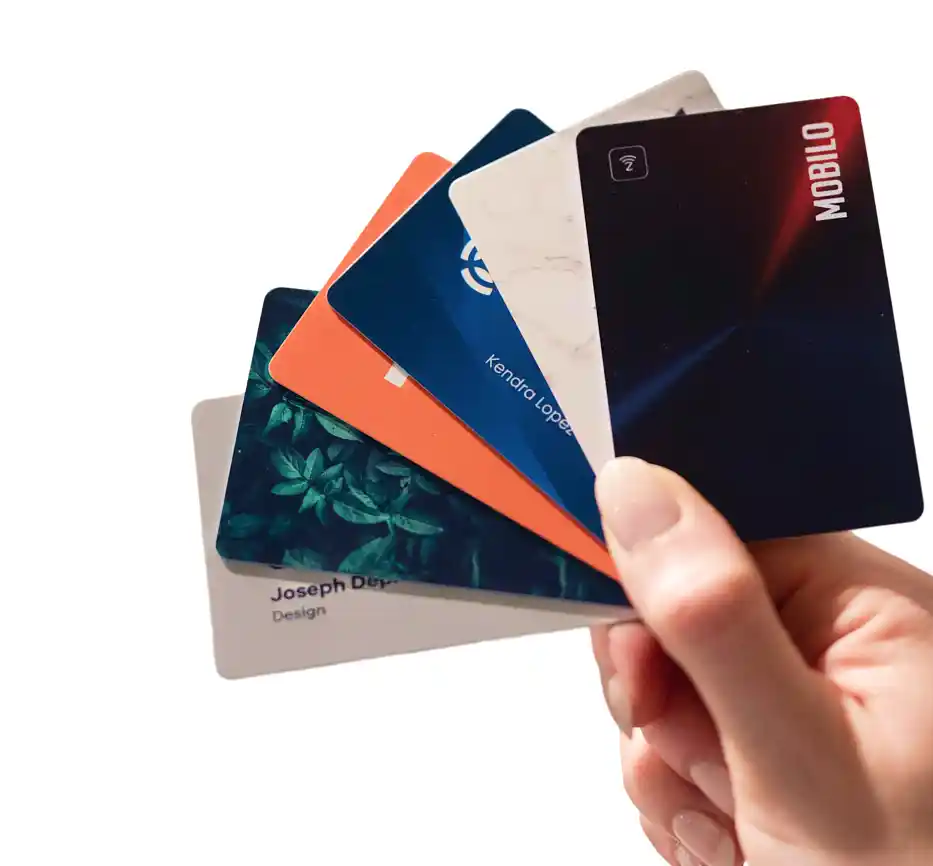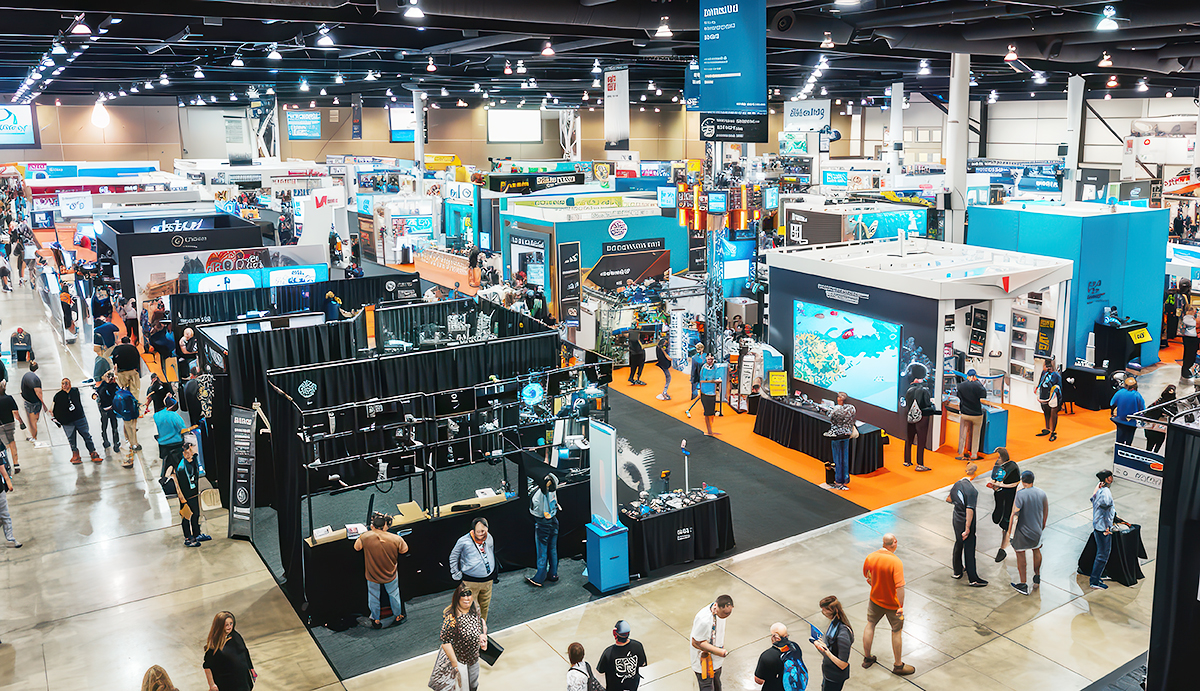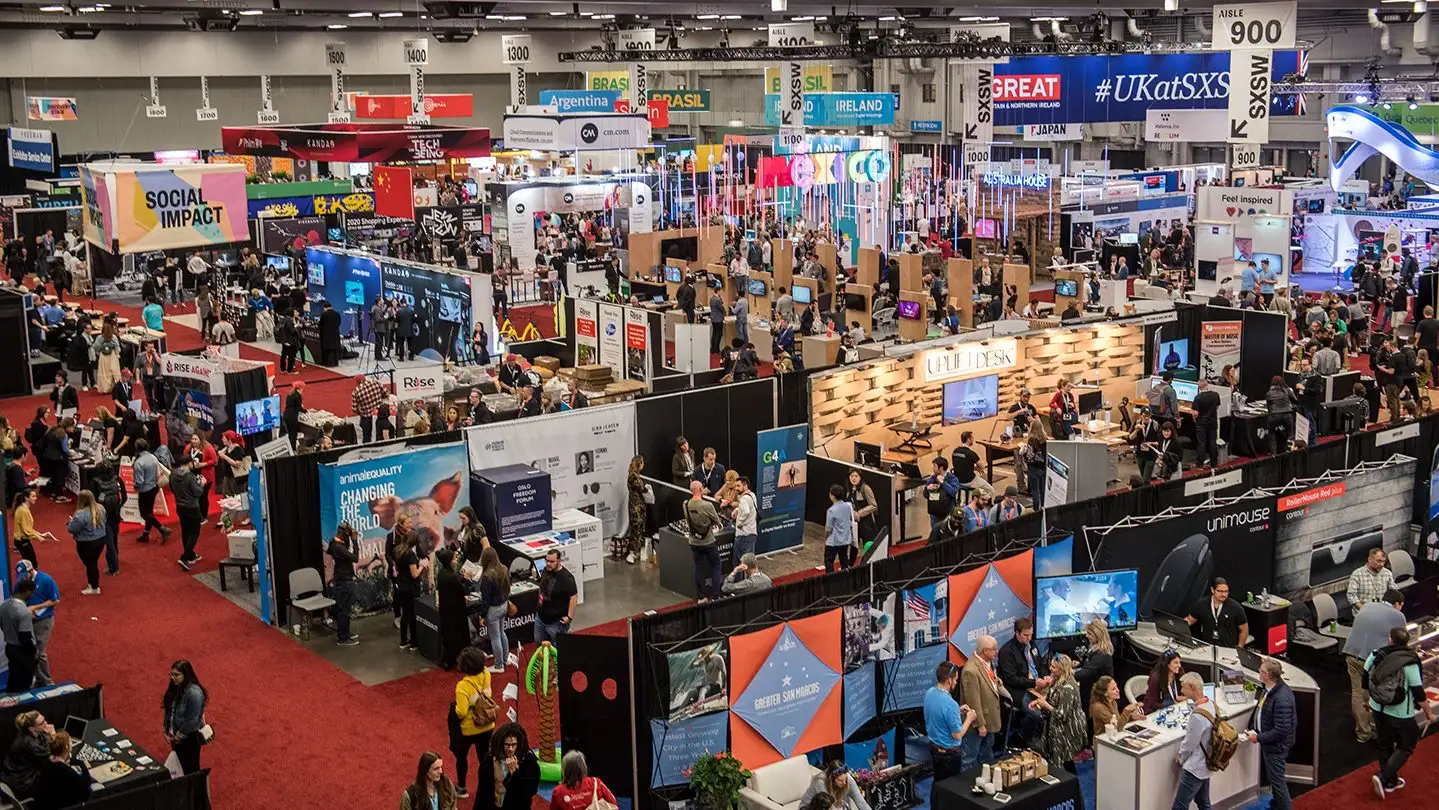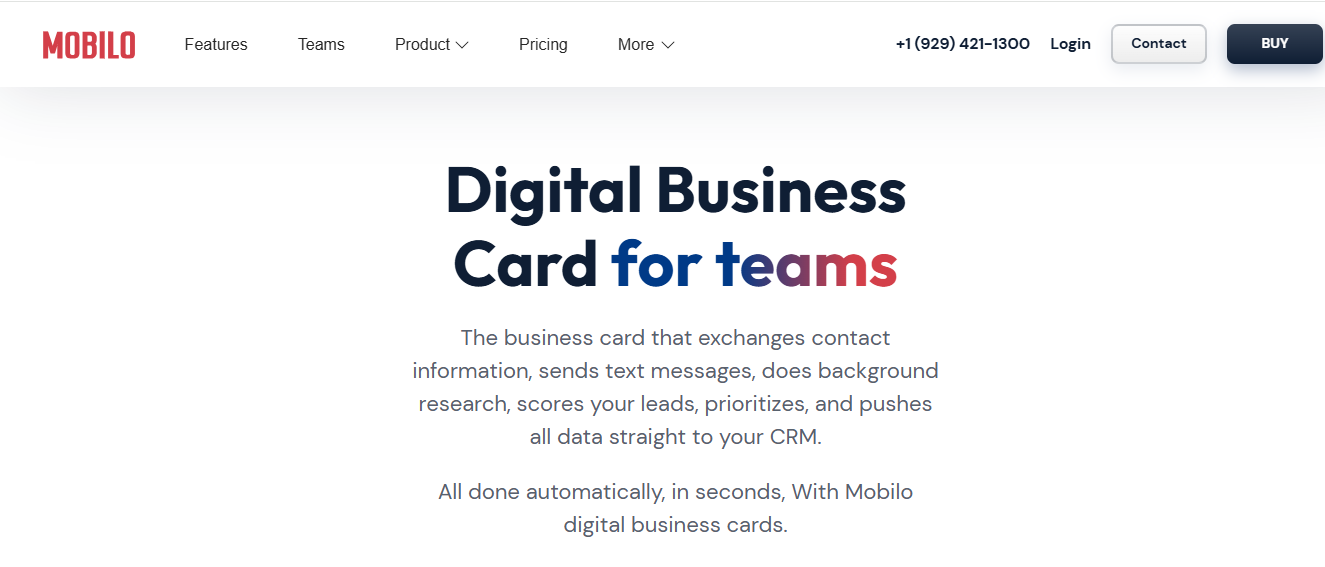Don’t leave without 75% off
Get a Mobilo Branded Card for $5 or a Custom Card for $10
Plus 90 days of Pro free.

.avif)

Get a Mobilo Branded Card for $5 or a Custom Card for $10
Plus 90 days of Pro free.

.avif)


You stand at a busy booth, attendees tapping phones and handing over cards, and you need to separate casual interest from genuine buyers. NFC technology now turns a quick tap into accurate attendee data, making contact capture faster and cleaner than paper lists or badge scans. Suppose you want a clear plan for collecting leads at a trade show, from boosting booth engagement and lead generation to qualifying prospects and improving conversion rates. In that case, this article gives practical steps to capture high-quality leads and convert them into measurable sales while maximizing return on investment with minimal wasted effort.
Mobilo's digital business card makes that process simple by turning a tap into a verified contact, feeding attendee data straight into your CRM, and speeding follow-up so you can track leads through the sales pipeline and measure conversion and ROI.
This is where Mobilo's Digital Business Card fits in: it addresses in-booth intent capture by converting a tap into a verified, CRM-synced contact with time-stamped activity, reducing cleanup and accelerating follow-up.

Capturing leads at a trade show is not a nice-to-have; it is the event’s primary lever for measurable business outcomes: sales, customer acquisition, and lasting partnerships depend on it.
If you treat trade shows as brand theater without a plan to convert interactions into qualified contacts, you leave pipeline on the floor.
Good lead collection converts impressions into predictable revenue. Many companies report substantial payback from exhibitions, with some Fortune 500 teams earning $5 for every $1 spent on shows by capturing and pursuing the right contacts.
The data point 81% of attendees have buying authority, from Moots, makes clear that the right conversations at a booth can turn into immediate procurement decisions, not just future interest.
Trackable KPIs like test-drive sign-ups, dealership visits, vehicle inquiries, brochure or spec-sheet downloads, and follow-up appointment bookings let you translate those conversations into measurable pipeline and prioritize outreach by intent.
Badge scans give you names. They rarely give you why the person stopped, what problem they were solving, or whether they held purchasing authority. Worse, the industry still sees the same operational failures over and over, as reflected in the sobering fact that 80% of leads never receive follow-up, which explains why so many event investments evaporate.
The result is a pile of raw contacts that require manual cleanup, enrichment, and guesswork, time your sales team does not have. This pattern appears across enterprise events and regional shows: teams collect lots of data, then lose momentum because the signals they need to prioritize and personalize outreach are missing.
If your goal is conversions, design capture around context, timing, and fit, not just contact capture. Capture the action that signals intent, for example, a signed demo slot or a spec sheet download, and push that signal immediately into scoring rules so sales knows who to call first.
Use time-stamped activity and behavioral KPIs to separate high-intent prospects from casual visitors. That approach makes follow-up faster, more relevant, and far more likely to convert.
Most teams handle lead capture with a patchwork of badge scans, paper cards, and manual entry because those methods are familiar and require no new approvals. As event volume increases and reporting needs grow, that familiarity becomes a hidden cost: data fragments across spreadsheets, follow-up windows close, and marketing cannot prove ROI.
Platforms like Mobilo provide an alternative path, combining NFC, QR, and Apple NameDrop sharing with:
Teams convert event interactions into a measurable pipeline. At the same time, enterprise features such as SSO/HRIS provisioning, admin controls, and SOC 2 and GDPR-aligned security keep governance intact as scale grows.
A data-driven follow-up rhythm changes outcomes. When you capture intent at the moment of interaction and feed it into scripted, prioritized outreach, you stop leaving opportunities to chance and start building repeatable event playbooks that sales can execute confidently.
That simple shift sounds obvious, but the most damaging losses still happen after the booth, when follow-up stalls and decisions move on.
But the real test is how you capture that intent in the moment at a busy booth, and that is where things get interesting.

Capture depends on a mix of low-friction tech, intentional incentives, and human follow-through; use the right tool for the moment and make every exchange deliver context, not just a contact.
Below you’ll find practical, deployable tactics grouped so you can pick the ones that match:
Choose an app that syncs directly to your CRM and trains staff to use it like a single source of truth.
Practical steps:
Test the workflow end to end before the first setup, so nothing breaks when traffic peaks.
Place scanners or NFC tags at conversational checkpoints, not just at the register.
The best practice is a two-step flow:
That small habit turns a name into a qualified lead instead of a paper-only memory.
Equip a staffer with a card-scanning app and an agreed naming convention. Capture time, event source, and a one-line note so scanned cards arrive with context.
Automate duplicate detection to prevent your CRM from being overrun with duplicates.
Deploy tablets with short forms and conditional fields that expand only when someone qualifies, keeping sign-up time under 30 seconds. Place a staffer nearby to assist; unattended kiosks work for light traffic, but a human nearby increases completion rates and adds conversational context.
Offer an easy keyword and short code for people to text, then send a confirmation and an immediate value item, like a scheduling link. Use double opt-in where required, and route SMS captures into your CRM with a source tag so you can measure performance.
Use short, mobile-first landing pages with pre-filled fields where possible. Place QR codes on booth surfaces, badges, and hands-on demos so scanning is natural.
A simple trick: include a two-field form (email and one qualifier) to lower friction while collecting meaningful data.
After every demo, ask for a one-question rating and an optional email for follow-up. That yields higher-quality contacts because respondents just invested time and attention. Save the verbatim feedback to enrich follow-up messaging notes.
Add a pixel to demo landing pages and thank-you pages so you can retarget anonymous visitors after the show. Match UTM-tagged campaigns to the pixel to stitch web behavior to event-driven outreach.
Run location-targeted ads to attendees during show hours and the day after, and connect those ads to a capture funnel. Pair geofencing with pixel data so you can retarget visitors who didn’t stop by and nurture them later.
If you need verified, in-market prospects at scale, consider a partner that sources and qualifies leads before the show, so your team focuses on conversion rather than cold list-building.
Make entry meaningful by asking for a role and a purchasing timeline, not just an email. Use the prize to attract your ICP; a high-value, relevant prize filters entrants and signals seriousness.
Create a time-limited landing page and require email plus one qualifier. Tie the discount to an immediate action, such as booking a demo within 14 days, to drive measurable follow-up.
Brand the photo and gate delivery behind a simple email field. Add a checkbox for future contact and segment entrants as marketing-sourced leads.
Design tasks that reveal product value while collecting short codes or answers. Require an email at submission and offer tiered rewards for deeper engagement.
Give a short, high-value guide in exchange for email and one qualifying checkbox. Deliver instantly, and include a follow-up CTA to book a demo.
Promote 10-minute consults with clear outcomes and require sign-up. When you schedule these in your CRM, assign reminders and prep notes so the consult starts with value, not discovery.
Run scheduled demos with limited seats. Collect names during registration and send calendar invites immediately. Attendance rates improve when you keep demos tight and outcome-focused.
Ask attendees to register for slides or bonus resources, and collect emails at the end of the talk. Tag these leads as “session attendees” so follow-ups reference the talk directly.
Promote short, fixed slots before the event and protect them with confirmations. A 15-minute pre-booked demo produces far higher conversion than ad-hoc booth chats.
Design an interactive tour that asks for a single field to begin. People approach from curiosity; capture their email plus one qualifier in exchange for a personalized walkthrough.
Let prospects try the product and require a short sign-up for saved progress or results. That captures leads who have already engaged deeply enough to try the product.
Make prize claims conditional on valid contact info and a qualification checkbox. Games are attention multipliers, but the prize should align with buyer intent.
Require a one-minute qualification form for entry. This screens for decision-makers and creates quiet time for longer conversations.
Offer a small perk for tagging the booth on LinkedIn or Instagram, and capture a follow-up email via a link in your bio or a landing page.
A typical pattern emerges across small booths and large exhibits: attendees are overwhelmed, and manual card entry or badge scans without context leave follow-up hollow. When the floor gets busy, the failure point is not the capture method; it is the lack of immediate context.
That is why short qualifying questions, time-stamped notes, and source tags are the decisions that change post-show conversion.
Most teams collect contacts with sensible, familiar tools, but that familiarity hides a cost, especially as it shows scale. The familiar approach is badge scans or business-card piles because they require no workflow changes. As interaction volume rises, those fragments need manual enrichment and prioritization, adding hours of cleanup and delayed outreach.
Platforms like Mobilo provide integrated sharing modes, CRM-native connectors, and automatic lead scoring, so teams preserve context from the moment of exchange, compressing cleanup time and making follow-up actionable rather than guesswork.
Outreach 2–3 weeks before the show, offering short reserved slots. Promised face time turns a passive prospect into a committed meeting, and calendar invites reduce no-shows.
Send targeted invites with one clear reason to visit. Spotlight a single activation, and use concise social posts to remind attendees where and when.
Optimize the copy for how buyers search, and link directly to an RSVP or demo sign-up page so interested attendees convert before they arrive.
Run a short campaign, like a downloadable checklist or contest that requires booth attendance to complete entry. That converts online interest into a physical visit.
Because most attendees are actively exploring options, you should prioritize pre-show touches that set expectations. According to Exhibit Surveys Inc., 92% of trade show attendees are looking for new products, so a targeted pre-show campaign can turn that curiosity into a scheduled interaction.
Reference the specific interaction and a promised next step. Speed and specificity make the difference between a conversion and a forgotten booth encounter.
Create hot, warm, and cold buckets at import and route them to different sequences. Use the qualifier data you collected on-site to drive the cadence.
Mention the demo feature or the conversation moment that mattered. A 30-second tailored line shows you were listening.
Set sequences that feel human:
Use merge fields from your capture fields to keep messages relevant.
Lead with a resource, not a pricing note. Invite them to a webinar, send the session slides, or offer a technical note to further the relationship.
Track both total leads and the percentage that qualify to avoid vanity counts. A smaller list of qualified contacts outperforms a huge, unfiltered one.
Measure total leads captured, cost per lead, percentage of qualified leads, post-show meeting conversions, and sales pipeline attribution. Add time-to-first-contact as a KPI to test how follow-up speed affects pipeline conversion.
UTM tags, landing page conversions, and QR-code scans let you separate trade-show-driven leads from other channels. That clarity makes future budgeting decisions evidence-based.
Turn your metrics into actions: if cost per lead is high but conversion is strong, keep the show. If you collected many contacts and closed none, change the capture qualifiers or the pre-show targeting.
Practical reminder about buyer composition: treat qualification as essential, not optional, since a large share of attendees can influence buying decisions. According to Trade Show News Network, 80% of trade show attendees have buying authority in 2023, so the right prioritization and rapid follow-up can directly influence procurement conversations.
That one follow-up step that feels small now, when executed fast and with context, flips the math on whether a show becomes pipeline or paperwork. Keep reading, because what comes next reveals a surprisingly simple offer that forces you to rethink the setup cost versus runway trade-off.

We know swapping a familiar badge or paper workflow feels risky, so try Mobilo with a short demo and a low-friction pilot that proves impact in days, not quarters.
Book a demonstration and access promotional trials such as DemoLoot, First 25 Cards Free (Worth $950), and 25 cards free, so your team can validate lead capture, CRM sync, and governance without a heavy upfront spend.